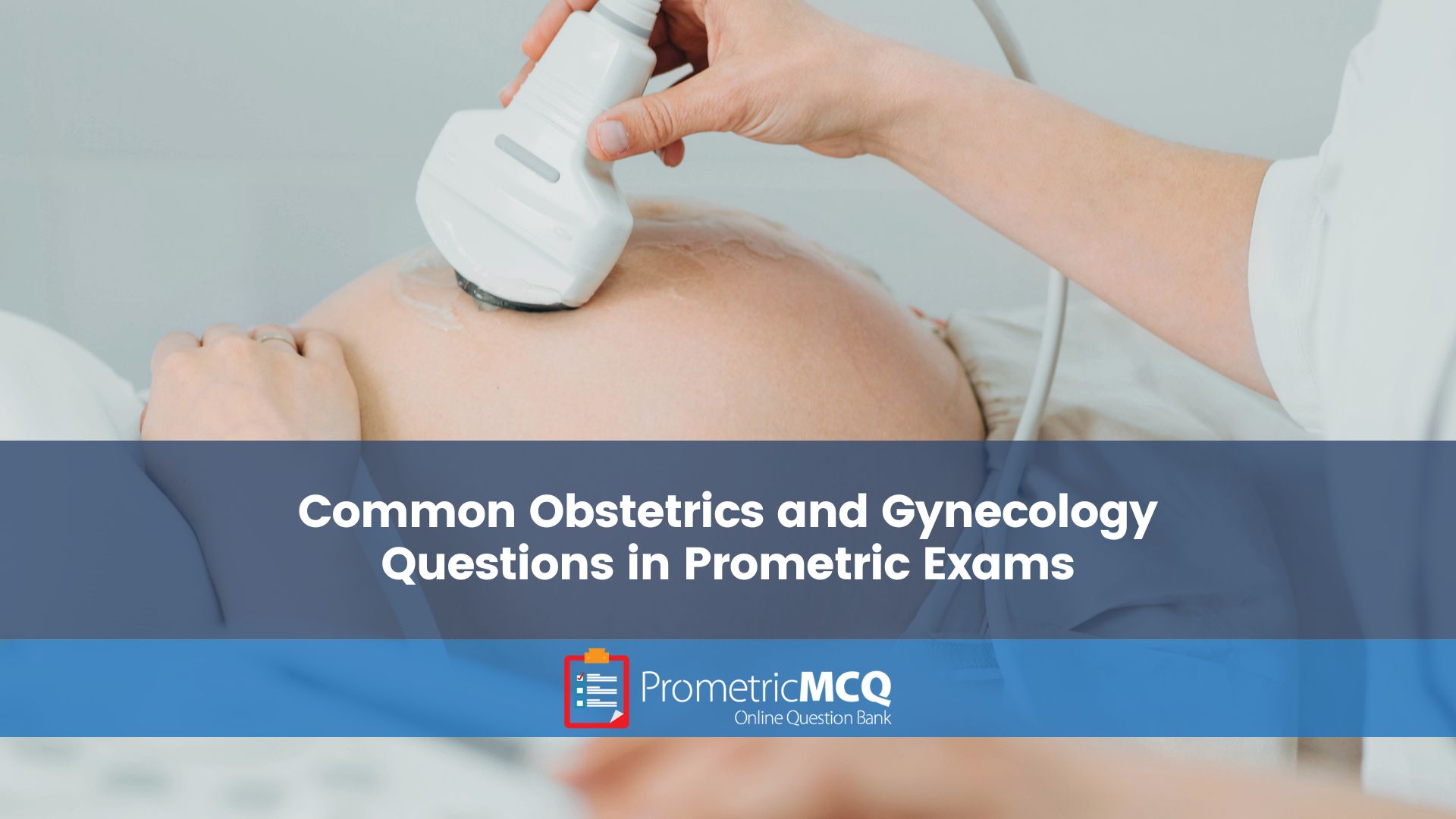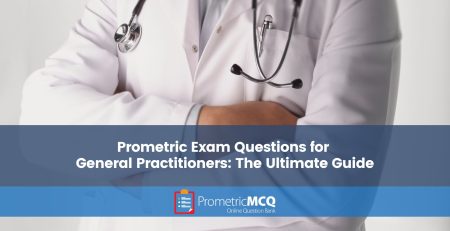Common Obstetrics and Gynecology Questions in Prometric Exams
Are you gearing up for the Prometric exams in Obstetrics and Gynecology? If so, you’re not alone! Many aspiring healthcare professionals find themselves navigating a sea of information and questions that can feel overwhelming.
But fear not—this study guide is here to illuminate your path! In this post, we’ll tackle the most common Obstetrics and Gynecology questions featured on the Prometric exams, providing clarity and confidence as you prepare.
Whether you’re brushing up on essential concepts or seeking tips on how to approach tricky scenarios, our comprehensive guide will equip you with the knowledge needed to excel. Let’s dive into the world of maternal health, reproductive wellness, and exam success together!
Introduction to Prometric Exams
Preparing for Prometric exams can feel overwhelming, especially when it comes to the vast field of Obstetrics and Gynecology. This specialty covers a wide range of topics that are essential for understanding women’s health. Whether you’re a medical student or a resident brushing up on your knowledge, mastering these concepts is crucial not just for passing the exam but also for your future practice.
As you dive into the world of Obstetrics and Gynecology questions in Prometric exams, you’ll encounter scenarios that test your clinical reasoning skills and application of knowledge. From pregnancy complications to hormone therapy management, each question presents an opportunity to showcase what you’ve learned.
This study guide aims to illuminate common queries encountered in Prometric exams while equipping you with effective strategies to tackle them confidently. With thoughtful preparation, you’ll be well on your way to acing those difficult questions and advancing through your medical career. Let’s explore what lies ahead!
Overview of Obstetrics and Gynecology Questions in the Exam
Obstetrics and Gynecology questions in Prometric exams focus on a range of crucial topics. They assess your understanding of women’s health, pregnancy complications, reproductive system disorders, and more.
These questions often present clinical scenarios that require analytical thinking. You might encounter case studies involving prenatal care or menstrual cycle irregularities.
Expect to see both multiple-choice and scenario-based queries. This format tests not only knowledge but also application skills in real-world situations.
Stay alert for updates on guidelines and protocols related to obstetrics and gynecology. Familiarity with the latest practices can provide an edge during the exam.
Understanding concepts rather than rote memorization is key here. It enables you to tackle unfamiliar questions effectively when they arise during your testing experience.
Tips for Approaching Obstetrics and Gynecology Questions
When tackling Obstetrics and Gynecology questions, start by carefully reading each question. Pay attention to keywords that hint at what the examiner is asking.
Break down complex scenarios into smaller parts. This makes it easier to identify relevant concepts.
Use a process of elimination for multiple-choice questions. Discard obviously incorrect answers first, narrowing your options effectively.
Practice active recall by quizzing yourself on various topics regularly. This helps reinforce your understanding and retention of key facts.
Stay calm during the exam; anxiety can cloud judgment. Take deep breaths if you feel overwhelmed.
Lastly, familiarize yourself with common clinical vignettes often found in exams. Recognizing patterns can boost confidence and improve response time on test day.
Common Topics and Concepts in Obstetrics and Gynecology Questions
Obstetrics and gynecology encompass a wide range of topics that are crucial for understanding women’s health. Pregnancy-related questions often delve into prenatal care, labor processes, and postpartum complications. Familiarity with these areas is essential for anyone preparing for the Prometric exams.
The menstrual cycle and reproductive systems also play a significant role in exam questions. Topics may include hormonal regulation, ovulation phases, and disorders affecting menstruation.
Infertility is another major focus area. Expect to encounter scenarios related to diagnostic methods, treatment options like IVF, and counseling techniques.
Sexually transmitted infections (STIs) present vital concepts as well. Questions will likely address identification, prevention strategies, and their long-term implications on reproductive health.
Lastly, menopause and hormone replacement therapy frequently arise in this context. Understanding symptoms management options can be key in answering relevant exam questions effectively.
– Pregnancy-related questions
Pregnancy-related questions are a significant focus in Obstetrics and Gynecology sections of Prometric Exams. Understanding the physiological changes during pregnancy is crucial.
Expect to tackle inquiries regarding trimesters, fetal development stages, and common complications like gestational diabetes or preeclampsia. Familiarity with prenatal care guidelines can be beneficial as well.
You may also encounter scenarios involving labor and delivery processes. This includes recognizing signs of labor, managing pain relief options, and understanding emergency interventions.
Additionally, questions may delve into maternal health issues that impact pregnancy outcomes. Topics such as mental health considerations and chronic conditions warrant attention too.
Grasping these concepts will not only help you answer exam questions accurately but also enhance your practical knowledge for real-life situations in maternity care.
– Menstrual cycle and reproductive system questions
Understanding the menstrual cycle is vital for those tackling Obstetrics and Gynecology questions in Prometric exams. Many questions focus on the phases of the cycle, including menstruation, follicular phase, ovulation, and luteal phase.
You may encounter queries about hormonal regulation. Knowing how estrogen and progesterone interact during each stage can help clarify many scenarios presented in exam questions.
Reproductive anatomy often appears as well. Familiarize yourself with structures like ovaries, fallopian tubes, uterus, and cervix. Questions might ask you to identify their roles or potential disorders affecting these organs.
Be prepared for real-life applications too. Scenarios involving common conditions such as polycystic ovary syndrome (PCOS) or endometriosis frequently show up in assessments. Understanding symptoms and treatment options will be beneficial when facing these topics on your test day.
– Infertility questions
Infertility questions in Prometric exams often focus on the underlying causes and treatment options. They assess your understanding of both male and female infertility factors.
Understanding hormonal imbalances, structural abnormalities, and genetic issues is crucial. Questions may cover conditions like polycystic ovary syndrome (PCOS) or endometriosis.
Treatment modalities are equally important. You should be familiar with medications such as Clomiphene citrate, as well as assisted reproductive technologies like IVF.
It’s also beneficial to know about the psychological aspects of infertility. Many candidates overlook this dimension, yet emotional support plays a vital role in patient care.
Familiarize yourself with diagnostic tests too—ovulation tracking or semen analysis might come up frequently. Being prepared for these diverse concepts can enhance your performance significantly during the exam.
– Sexually transmitted infections (STIs) questions
Sexually transmitted infections (STIs) are a crucial topic in Obstetrics and Gynecology questions during Prometric exams. Understanding the prevalence, symptoms, and treatment options is essential for success.
Questions often cover common STIs like chlamydia, gonorrhea, syphilis, and herpes. You may encounter scenarios that require identifying signs of infection or understanding the implications for pregnancy.
It’s important to familiarize yourself with screening guidelines and preventive measures. Knowledge of how STIs can affect reproductive health will also be beneficial.
Consider focusing on the latest research regarding vaccination options, such as the HPV vaccine. This knowledge could set you apart in answering complex exam questions related to prevention strategies.
Studying case studies can enhance your grasp of real-world applications. They provide context on patient interactions and management approaches when discussing STIs in clinical settings.
– Menopause and hormone replacement therapy questions
Menopause marks a significant transition in a woman’s life. It typically occurs between ages 45 and 55, signaling the end of menstrual cycles. Understanding its symptoms is crucial for exam success. Questions may cover hot flashes, mood swings, and sleep disturbances.
Hormone replacement therapy (HRT) often emerges as a topic of interest during Prometric exams. HRT can alleviate menopause-related symptoms but comes with risks that candidates should be familiar with.
Exam questions might focus on the benefits of HRT versus potential side effects like increased risk of certain cancers or cardiovascular issues. Knowing when to recommend HRT based on individual patient history is essential.
Candidates should also grasp alternative treatment options available for managing menopause symptoms, such as lifestyle changes and non-hormonal medications. This balanced knowledge will prepare you effectively for related questions in your Prometric examination journey.
Practice Questions for each topic
Pregnancy-related questions often cover topics such as gestational age, prenatal care, and complications. Expect scenarios involving labor stages or fetal development.
Menstrual cycle queries typically ask about hormonal changes and phases. Knowing the average cycle length and common disorders is crucial.
Infertility questions may focus on both male and female factors, including ovulation issues or sperm quality. Familiarity with diagnostic tools like ultrasonography can be helpful here.
For sexually transmitted infections (STIs), anticipate questions on prevention methods, symptoms, and treatments for conditions like chlamydia or gonorrhea. Understanding their long-term effects is also key.
Questions related to menopause often touch on symptom management and hormone replacement therapy options. Recognizing risk factors for osteoporosis in postmenopausal women could come up too.
Practicing these diverse question types will build confidence and enhance your knowledge base effectively.
How to Study for Obstetrics and Gynecology Questions on Prometric Exams
Studying for Obstetrics and Gynecology questions requires a strategic approach. Focus on understanding core concepts rather than rote memorization. This will help you apply your knowledge effectively during the exam.
Utilize recommended study resources such as textbooks, online courses, and review guides specific to Prometric exams. These materials often highlight frequently tested topics.
Create a structured study schedule. Allocate time blocks dedicated to different subjects within obstetrics and gynecology. Consistent practice can enhance retention.
Engage in active learning techniques like flashcards or group discussions to reinforce key ideas. Test yourself with practice questions regularly to gauge your progress.
Don’t forget about self-care during this intense preparation period. Stay hydrated, take breaks, and ensure you’re getting enough rest for optimal cognitive function while studying.
– Recommended study resources
When diving into Obstetrics and Gynecology questions in Prometric exams, selecting the right study resources is crucial. Start with comprehensive textbooks that cover the core concepts extensively. ‘Williams Obstetrics’ is a classic choice, offering detailed insights into pregnancy and childbirth.
Online platforms can also be invaluable. Websites like Medscape or UpToDate provide up-to-date information on clinical practices and emerging research in obstetrics and gynecology. Additionally, consider joining forums or social media groups where fellow aspirants share their experiences.
Practice question banks are essential for familiarizing yourself with exam formats. Resources like UWorld or Kaplan offer targeted practice tailored to Prometric exams.
Lastly, don’t underestimate the power of video lectures. Platforms such as YouTube host numerous channels dedicated to medical education, breaking down complex topics into digestible content that enhances understanding.
– Time management tips
Time management is crucial when preparing for Obstetrics and Gynecology questions in Prometric exams. Start by creating a study schedule that allocates specific time blocks for each topic. This helps maintain focus.
Set realistic goals for each session. Break down complex subjects into smaller, manageable segments. Completing these tasks can provide a sense of achievement and keep motivation high.
Utilize tools like timers or apps to track your study intervals. The Pomodoro Technique, which involves studying for 25 minutes followed by a short break, can boost concentration.
Avoid multitasking during your study sessions; it often leads to decreased efficiency. Instead, dedicate full attention to one subject at a time.
Lastly, regularly review what you’ve learned to reinforce retention over the long term. A structured approach will help you feel more prepared on exam day without feeling overwhelmed.
Conclusion
Preparing for Prometric exams can be a daunting task, especially when it comes to Obstetrics and Gynecology questions. Understanding the structure of these questions and familiarizing yourself with key concepts simplifies your study process.
By focusing on specific topics—such as pregnancy-related issues, menstrual cycles, infertility, sexually transmitted infections (STIs), and menopause—you can enhance your knowledge base significantly. The practice questions outlined in this guide serve as a crucial resource for self-assessment.
Utilizing recommended study materials combined with effective time management strategies will also help you stay organized and focused throughout your preparation journey. Whether you’re studying alone or collaborating with peers, committing to consistent practice is essential.
Embrace the challenge of mastering Obstetrics and Gynecology Questions in Prometric Exams by implementing these tips. Your dedication will pave the way for success in achieving your clinical goals.









